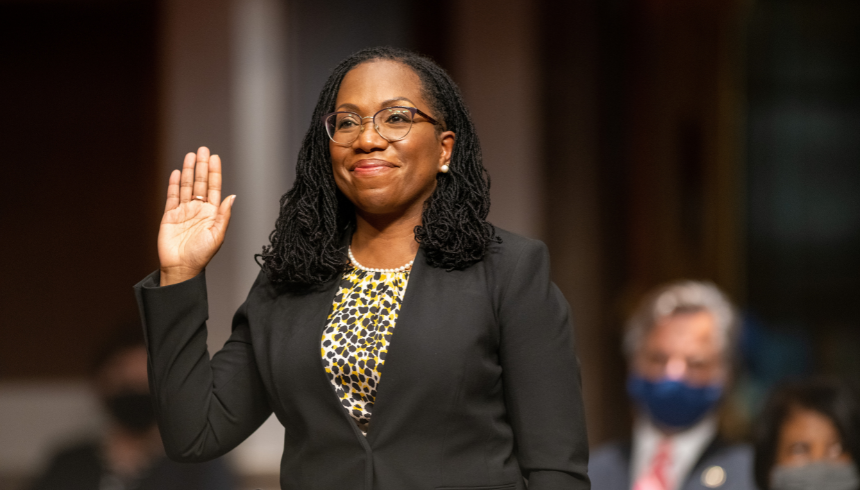Across 233 years of history, the United States Supreme Court has relied on the legal expertise of 115 sitting justices. Among these justices and across those centuries, only five justices were women and only three minorities.
With that in mind, it made sense that then-candidate for president Joe Biden promised that if he had an opening on the court, he would nominate a black woman. And for the first time in 233 years, the President of the United States did just that recently in selecting Judge Ketanji Brown Jackson to serve on the nation’s highest court.
Previously, Biden successfully nominated the jurist to the Federal Court of Appeals in Washington with the U.S. Senate confirming her with the support of three Republicans, even: Sen. Lisa Murkowski of Alaska, Sen. Lindsey Graham of South Carolina, and Sen. Susan Collins of Maine.
In a curious development following Biden’s nomination of the D.C. circuit court judge to the Supreme Court, none of the Republicans who voted for her previously would commit to voting for her again.
“For too long our government, our courts, haven’t looked like America,” the president said alongside Vice President Kamala Harris, herself the nation’s first Black and Asian and female vice president. During a presentation last month at the White House, Biden commended Judge Jackson’s intellect, legal ability, and experience, as well as the representation she carries, both in identity and life experience.
According to a Pew Research analysis in January, only 70 of 3,843 federal judges, merely two percent, in the United States have ever been Black women.
If confirmed, Jackson would be the sixth woman to serve on the Supreme Court, following Sandra Day O’Connor, Ruth Bader Ginsburg, and current justices Sonia Sotomayor, Elena Kagan, and Amy Coney Barrett. As an African American, she would be just the fourth justice who is not white, along with Justices Sotomayor and Clarence Thomas (who are Latina and Black, respectively), as well as former Justice Thurgood Marshall, himself the first Black American to sit on the court.
Despite Judge Jackson’s sterling judicial credentials, she’s encountered racist dog whistles plaguing her nomination as she and the White House prepare for hearings before the Senate Judiciary Committee, set to start on March 21.
Even though he voted to confirm her to the D.C. appeals court just one year ago,, Republican Sen. Lindsey Graham has already expressed consternation, tweeting that her nomination is a victory for the “radical left.” In one of the more stark examples of a double standard, Fox News personality and Hungarian authoritarian admirer Tucker Carlson wondered why her LSAT scores have not been released.
It is not normal for nominees to share their LSAT scores. In fact, it appears that no white nominees have ever been required to share their test scores.
In other words, a double standard preceded Jackson’s nomination. It was even on display during her last hearings as a nominee to the D.C. circuit. Reporting for Mother Jones, Stephanie Mencimer compiled a brief list of just a few of the offensive and bizarre things Republicans have observed or asked her.
In perhaps the most bitingly ironic case, Mississippi Sen. Roger Wicker, himself a legacy student at University of Mississippi Law School whose father was a prosecutor and elected official, secured his senate seat not through the standard elections process but instead via appointment and special election following former Sen. Trent Lott’s resignation, mused that Brown Jackson was a beneficiary of “positive affirmative action.” Wicker made the comments to a local radio personality, the context of which involved Wicker’s bemused exasperation that the federal jurist would be in a position to rule on affirmative action cases.
Likewise, Texas Sen. John Cornyn inquired at her appellate court nomination hearings to what extent her race affects her work as a judge. It does not appear that Cornyn has asked this question of any white or even Asian or Latino nominees before.
Jackson avoided the pitfalls around Cornyn’s question and responded with extraordinary grace. She observed that race was an inappropriate factor in her decision-making. She then quoted iconic Supreme Court Justice Oliver Wendell Holmes: “The life of the law has not been logic. It has been experience.”
She then added, “I’ve experienced life in perhaps a different way than some of my colleagues because of who I am, and that might be valuable, if I was confirmed to the court.”
After getting his question answered, Cornyn voted against Jackson.
Judge Ketanji Brown Jackson was born in Washington, D.C., and raised in Miami, the child of a teacher and a lawyer. In her nomination acceptance speech, she said that her interest in law goes all the way back to seeing her dad study while he was in law school. Her own legal experience includes time as a federal public defender.
In March 2017, she told students at the University of Georgia law school: “I learned how to reason and how to write. And I gained the self-confidence that can sometimes be quite difficult for women and minorities to develop at an early age. I have no doubt that of all of the various things that I’ve done, it was my high school experience as a competitive speaker that taught me how to lean in, despite the obstacles. To stand firm in the face of challenges. To work hard. To be resilient. To strive for excellence. And to believe that anything is possible.”
Civil rights activists, both traditional and new wave, stand ready to fight for Jackson’s nomination. This is why the #SheWillRise campaign at SistaSCOTUS.com has one measurable, achievable goal: to ensure a Black woman sits on the Supreme Court.
The group takes its name from Maya Angelou’s classic poem “Still I Rise” and uses the tagline “Using #BlackGirlMagic to get the first Black woman appointed to the U.S. Supreme Court” on its Twitter account.
Kimberly Tignor, the co-founder of the #SheWillRise campaign, is eager about Brown Jackson’s momentous step into American history.
“I think that what excited me the most, and that she just did so perfectly during her speech, is that she brings humanity and kindness,” noted Tignor on MSNBC recently. “I think it is in her aura…it is the feeling that the Court is not this distant thing made up of justices that cannot relate at all to your day-to-day life. She removed that. And she showed up as a complete person. As a mother. As a community advocate.”
Tignor goes on to say that “it’s that humanity that she brings to this moment and to her interactions that I think is just so wonderful and important.”





